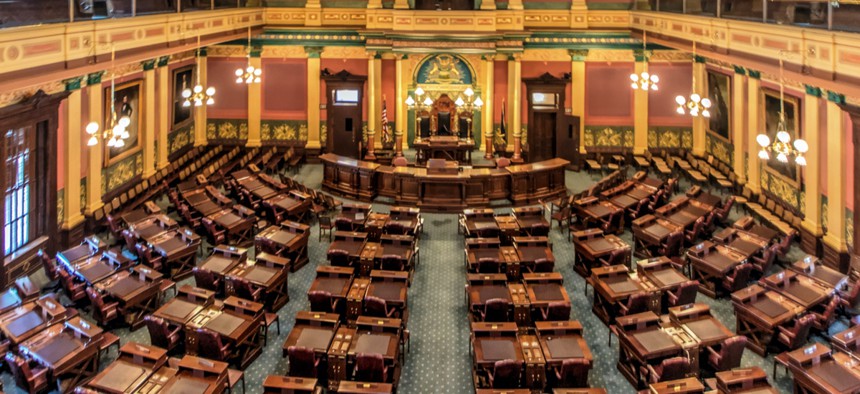Michigan Lawmakers to Do Away with Automatic License Suspensions

The bill, passed by lawmakers in Michigan, was part of a package of criminal reform legislation. Shutterstock
Legislators approved a bill that will stop the suspensions of driver's licenses for most unpaid fines and fees.
Lawmakers in Michigan last week approved a measure to end automatic suspension of driver’s licenses for most unpaid fines and fees, a common policy that advocates say perpetuates a cycle of poverty and incarceration for non-violent offenders.
The legislation, part of a package of criminal justice reform bills, amends the state’s vehicle code to eliminate driver’s license suspensions for unpaid fines and fees for many traffic violations, only allowing them when the underlying violation could involve the “injury, death, or serious impairment of a body function of another individual.” That includes driving while intoxicated and reckless driving, according to the bill.
“For too long, driver’s license suspensions have been overused as a punishment for a variety of offenses not directly tied to being a danger on the road, and with it, the practice has actually made poverty the ‘offense’ most often being punished,” Alex Rossman, external affairs director for the Michigan League for Public Policy, said in a statement following the vote. “Today’s action is another step toward smart justice that reins in overly severe and ineffective punishments, and another much-needed step toward improving racial equity and economic stability for Michigan residents and their families.”
Dozens of states suspend licenses for unpaid fines and fees, and the practice is particularly active in Michigan. Around 360,000 licenses are suspended each year in the state for unpaid fines or because drivers failed to appear in court, and driving without a valid license is the third most-common reason for jail admission in the state, according to data from the Michigan League for Public Policy.
In 2017, Michigan was one of just five states that accounted for 4.2 million drivers who had their licenses revoked because of failure to pay court debt, according to research from the nonprofit Fines and Fees Justice Center. (The other four were Texas, North Carolina, Virginia, and Tennessee.)
Advocates have long argued that suspending licenses to punish someone for being unable to pay fines is counterproductive. Without a valid driver’s license, people are often “unable to work, further impeding the ability to pay their fines and fees,” the American Bar Association said in a letter in July. “Frequently, the individual drives despite the suspension, which can result in other charges, incurring additional fines and fees and creating a vicious cycle of mounting debt and prolonged involvement with the legal system.”
The problem had worsened during the Covid-19 pandemic, the association continued, as limited access to public transportation made “travel even more difficult for those with suspended licenses.”
A number of states in recent years have passed legislation eliminating the practice of automatic license suspensions related to unpaid fines and fees. Idaho, Mississippi, Montana, Virginia and West Virginia have all discontinued the practice since 2018, and several other states, including Maryland, have considered similar legislation.
Congress has begun to address the problem as well. In July, Sen. Chris Coons, a Democrat from Delaware, and Sen. Roger Wicker, a Republican from Mississippi, introduced a bill to authorize targeted grants to states that repeal laws mandating license suspensions for unpaid fees. The legislation had bipartisan support and the backing of a broad array of groups, including prosecutors, law enforcement and civil rights organizations, but stalled in committee.
Michigan’s legislation has been approved by both the House and Senate, but needs to again be considered by the House before the measure is expected to head to Gov. Gretchen Whitmer. If enacted, it will take effect next October.
Kate Elizabeth Queram is a staff correspondent for Route Fifty and is based in Washington, D.C.
NEXT STORY: In One State, a Racial Equity Task Force Suggests 100 Ways to Change the Criminal Justice System





